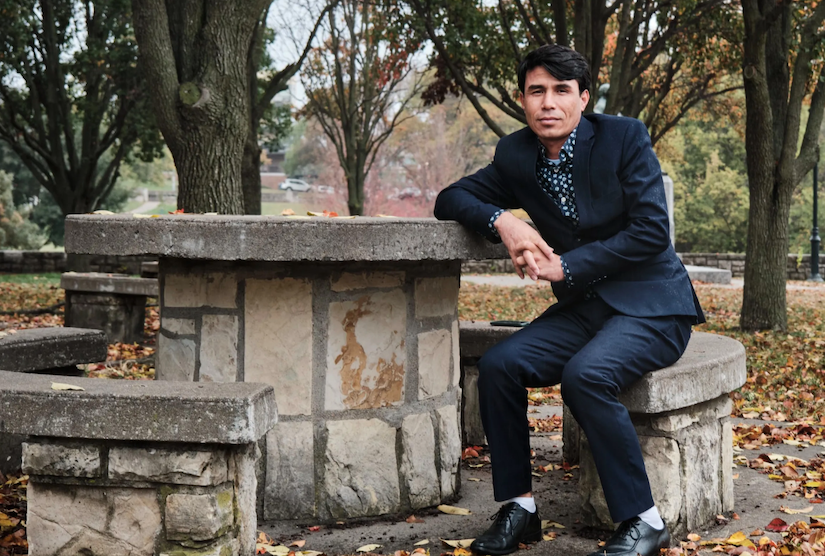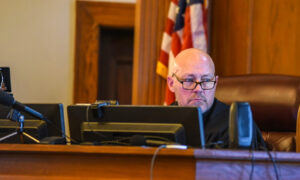5:50
News Story
Afghan refugees still adjusting to life in Kansas City — and wondering if they can stay
After the Taliban seized control of Kabul, Kansas City welcomed hundreds of refugees from Afghanistan in 2021. Two years later, many refugees are in search of stable housing as the question of their immigration status remains in the air
When the Taliban overtook Kabul in 2021, Qasim Rahimi went into hiding at a neighbor’s house.
Meanwhile, U.S. troops withdrew and took nearly 90,000 Afghan evacuees who were in danger of persecution. Rahimi knew he had to leave, too.
“I was a journalist and a director in (the) Afghanistan government when the government fell, so I was not feeling secure,” he said. “I had to escape.”
Rahimi’s two older brothers, one a journalist and the other employed with International Security Assistance Forces, found a way for much of the family, including Rahimi, to flee to a military camp in Germany. From there, he found his way to the United States and, eventually, Kansas City.
He is one of several thousand refugees who were granted humanitarian parole status. That grants them temporary admission to the U.S. based on threats they’d face to their lives if they stayed in their home country.
Once in Kansas City, Rahimi relied on Catholic Charities of Northeast Kansas for help settling in. The agency helped him find an apartment, apply for asylum status, find work and more.
While many Afghans have gotten far in their resettlement process, two years later, some refugees still face issues with housing and uncertainty about how long they can stay in the country as their temporary humanitarian parole status inches to its end.
What support did Afghan refugees receive?
The arrival of Afghan refugees meant a crush of work for local aid groups.
“It felt like a humanitarian crisis,” said Dr. Sofia Khan, the founder of KC for Refugees. “ It was overwhelming.”
Her group has helped roughly 1,000 Afghans since 2021, including one group of 20 families that landed at Kansas City International Airport with little money and even less understanding of their new environment.
“It was a time to tighten our belts and push ourselves,” Khan said, “not the time to walk away.”
She said her organization needed help from the local Afghan community to understand the new refugees’ cultural traditions and social norms.
They put together about 500 welcome baskets filled with Qurans, prayer rugs, prayer beads, black tea, dried fruit, nuts and electric tea kettles. Volunteers recruited the help of Afghan women to sew cushions for toshaks, floor cushions traditionally used as a couch or bed.
“We added things that bring family together and make them feel like they’re back home,” said Zhamilya Koshmambetova, a volunteer with KC for Refugees.
Koshmambetova also distributed more than 2,000 articles of clothing to children. Just as many articles of clothing were collected for adults, who had stricter requirements for their wardrobe.
“For many,” she said, “Western clothing was off the table.”
To accommodate refugee requests for traditional clothing, people from local South Asian communities and mosques stepped up to donate similar garments.
Health care and education also posed challenges. Jewish Vocational Service, a nonprofit that helps newcomers integrate into the community, set up refugees for health screenings, health care providers and vaccinations children needed to enroll in school.
“School enrollment was the biggest challenge because so many people came in at once, and our capacity to help people was down because of COVID, so there were less people coming in, then all of sudden more people came,” said Hilary Singer, the executive director of JVS.
“There was lots of waiting for people to get vaccines and challenges with school districts to get kids enrolled because they didn’t have vaccines or permanent addresses. We had to get creative.”
At first, Singer said, Kansas City Public Schools teachers came to the hotels and offered instruction to kids. Later, a bus was routed to the hotel to take children to the KCPS Global Academy, which is designed to help students transition to life in Kansas City.
“As hectic and busy as it was, (it) brought about real collaboration with our partners that had the benefit of the community in mind,” she said.
What challenges do Afghan refugees face?
Many Afghans have found some stability two years into their time in the U.S. Rahimi works as an immigration specialist, for example.
Yet housing remains an ongoing challenge for him and other refugees who don’t have an intuitive understanding of the rental market — or their rights as tenants.
Catholic Charities made it easy for Rahimi to find his first apartment. But when he went looking on his own in September 2022, he said the landlord pulled a bait-and-switch.
“They showed me the sample. I loved it and they told me everything was the same,” he said. “But when I moved into the apartment, the situation was bad and I wanted to leave.”
After multiple complaints to his landlord, Rahimi was moved to a different unit with very similar problems, including roaches and malfunctioning amenities.
“During the winter, the heat doesn’t work very well,” he said. “During the summer, the AC doesn’t work. I usually don’t have any hot water pressure.”
He’s asked city inspectors to take a look, but he’s reluctant to take his complaints to court for fear that could foul up his refugee status.
“I don’t have the mental or physical power to open a case like this at the moment,” he said.
Refugees also qualify for rent subsidies through the federal Section 8 program, but those apartments already have long waiting lists and come with restrictions that may keep families out.
“A lot of these families have four to five kids and Section 8 has strict rules on rooming. You can’t have a two-bedroom with five kids sleeping there,” said Khan, the founder of KC for Refugees. “Looking for larger homes with Section 8 restriction is even harder.”
While refugees wrestle with housing issues, they remain in limbo about their ability to stay in the country.
The humanitarian parole status that protected refugees from deportation and granted them the freedom to work for two years was set to expire this summer. In October, the federal government announced Afghans could apply for a re-parole process for a temporary period, but advocates say that extends refugees’ worries about their status rather than solves the issue.
“If folks want to be able to stay in this country permanently, that’s a one-by-one determination either through special immigrant visa process or the asylum process, and they’re cumbersome processes to engage in,” said Singer, the JVS executive director.
She said JVS submitted asylum applications for 80 families last summer. Only seven have had a formal decision since then.
“The vast majority of folks don’t have any sense of whether they can stay in the U.S. permanently,” she said. “It’s not like they have an alternative that is realistic.”
Their advocates say the stakes are high.
“A lot of these people were already targets of the current existing government over there,” said Khan. “There’s not really a way for them to be safe if they go back to Afghanistan.”
The importance of community aid
Refugees say their troubles finding work and apartments are small compared to the worries that linger about the family they left in Afghanistan.
“My psychological situation cannot be separated from Afghanistan,” Rahimi said.
He’s part of the Hazara ethnic tribe facing long-standing persecution at the hands of the Taliban.
“Here, you can buy a car, home or anything you want,” Rahimi said. “But in (Afghanistan), your sister doesn’t have enough food, your family doesn’t have security, and your niece or nephew can’t go to school.”
Rahimi has also not seen his wife, who lives in India, in seven years, and with his current migrant status, he is not sure when he will see her next.
Fatima Abbasi, who came to the U.S. from Afghanistan in 2018, also deals with feelings of guilt and remorse. Abbasi began to volunteer with KC for Refugees to provide support to young women coming from her country. But she can’t help but think of the support she wishes she could provide back home.
Her father died in Afghanistan in October before she had a chance to visit him. Her mother recently suffered a heart attack.
“I can help another refugee, but I can’t help my mom,” she said. “I have everything in the U.S. but my family.”
Still, Afghan refugees have begun to build a community here. Rahimi, for instance, has found something of a home in Kansas City.
“Everyone has some sort of issue with a new type of culture,” Rahimi said. “Fortunately, I have found the people of Kansas and Missouri to be very kind.”
The friendships he has made through work and school have aided Rahimi in learning to drive, purchasing a car and finding things to do on the weekends.
“When you’re trying to learn about a new culture, you need time,” he said. “But when you have a good community it doesn’t take as much time.”
This article first appeared on The Beacon and is republished here under a Creative Commons license.
Our stories may be republished online or in print under Creative Commons license CC BY-NC-ND 4.0. We ask that you edit only for style or to shorten, provide proper attribution and link to our website. AP and Getty images may not be republished. Please see our republishing guidelines for use of any other photos and graphics.





